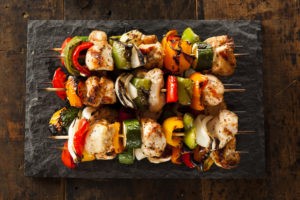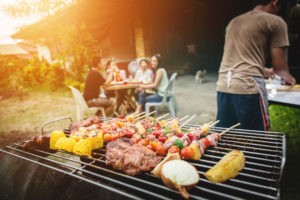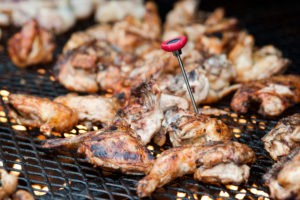It’s National Grilling Month! Here’s How To Maintain A Healthy Lifestyle During The Summertime

As we head thorough the summer, we find ourselves celebrating National Grilling Month during July!
During the summer months, the focus often seems to revolve around get-togethers involving food, such as picnics and BBQs. You don’t want to worry about sacrificing your eating program, or struggling to maintain your healthy lifestyle while participating in these fun summertime activities – and luckily, you don’t have to!
At NJdiet, we take weight loss and overall wellness to an entire new level. By utilizing
bloodwork
and performing DNA testing on each of our clients, we can determine each individual’s idea diet and workout plan. We customize supplementation along with a personalized diet plan to help every patient attain their weight and health goals.
So in honor of National Grilling Month, NJdiet wants to share our expertise on how you don’t have
to miss out on any summer festivities when on a weight-loss plan!
What Is Grilling?
Grilling is one of the most basic forms of food preparation. It is a centuries-old custom that dates back to the origin of cooking, as far as 2 million years ago. Back then grilling was about putting food on a stick and roasting it over an open fire — before people knew how to sauté, broil or braised, everyone grilled their food!
‘Grilling’ and ‘barbecuing’ are used interchangeably, though they are actually two slightly different cooking methods. While grilling means to cook your food ‘fast and hot’ directly over the fire; barbecuing uses a ‘low and slow’ method over indirect heat.
Healthy Grilling Tips
Grilling allows you the experience of being outside and socializing while you cook, while also being able to enjoy the health benefits that result from grilling your food. In fact, grilled foods are known to be healthier than foods cooked on the stove or in the oven. Fewer vitamins and minerals are lost when food is grilled compared to methods such as baking or frying.
Other Steps Toward Healthier Grilling
- Eat your veggies – kebabs are a great way to increase vegetable intake; for example making skewers of colorful bell peppers, onions, and small pieces of chicken or lean meat is an amazing, healthy meal. You can add fruit (such as pineapple, papaya, and/or mango) to skewers also!
- When grilling meat, prep it first – trim all visible fat, and if you’re grilling chicken, remove the skin before cooking. Marinades cut down on the smoke that sticks to the surface of the meat, and thin marinades are best, especially if they contain vinegar and/or lemon.
- Limit the time food is on the grill – don’t grill frozen meat; thaw it first to reduce the amount of time needed to cook it. Avoid charring or overcooking meats. Cut off and throw away any parts that become charred.
- Keep smoke to a minimum – avoid “smashing” or flattening burgers while they are cooking on the grill. This leads to higher levels of dripping juices and more unwanted smoke. Grill burgers at a lower heat and flip them once per minute until cooked.
Choosing What You Grill
When you decide to change your life by attending the Initial Evaluation and Consultation at NJdiet, we will explain how our unique individualized system works to reduce hunger and feel
healthier. We will explain how many metabolic factors are assessed to genetically make sure you not only lose the weight, but ensures you keep it off and stay healthy for a lifetime.
When it comes to utilizing grilling as a part of your eating plan, it’s common to think of hot dogs, burgers, and steaks when you think about grilling — however, you can easily make simple changes by choosing to grill chicken and fish, which can lead to healthier entrees than your typical red meat options.
Grilling is also one of the best ways to prepare vegetables. By simply using the freshest veggies you can find and adding flavor with rubs or marinades, you are making the perfect healthful choice for your grilling cookout! Veggies like asparagus, mushrooms, or zucchini can make for a great grilled sides. You can even try grilling fruits! The natural sugars of the fruit (pineapple is a good example) will caramelize on the grill and provide some interesting flavors to go along with the rest of your cookout meal.
Here are some other healthy tips to make your grilling a healthy (and delicious) option:
- Smart Seasoning for Healthy Flavor – Marinades and rubs can enhance flavor greatly. Even a little extra seasoning like red pepper flakes or minced garlic can add a whole new dimension on a familiar cut of meat. A good marinade can be made a day in advance so that you can have the meat sit in and absorb flavor overnight. However, make sure that you avoid using too much salt or high-sodium condiments like soy sauce. Herbs such as rosemary have a ton of natural flavor without any added sodium.
- Healthy Drinks and Sides – Drinks and sides are an integral part of your meal, but they don’t have to affect your waistline. Sides are a great way to add some extra nutrients – and a little color – to your meal. Make a nice leafy green salad or a mixed fruit salad to introduce some fresh produce to your cookout. And when in doubt, stick to water with a wedge of lemon!
Safety While Grilling
Don’t let improperly prepared food ruin your BBQ. It’s important to take the necessary precautions to ensure you don’t become ill from grilling incorrectly. Here are some grilling “basics” that can help reduce your risk of getting a food-borne illness.
1. WASH YOUR HANDS: Wash your hands with warm soapy water for at least 20 seconds before and after handling any food to ensure your mittens are germ free and to reduce the risk of cross-contamination. By following this one rule you can dramatically reduce your risk of food illness. If you don’t have clean water available where you’re eating, bring along hand sanitizer or wipes.
2. RAW AND COOKED FOODS DON’T MIX: Two things that should ALWAYS be separated are raw and cooked foods. Cross-contamination is a big culprit in food-borne illness so be sure to keep raw foods away from cooked and prepared food sources. Be sure to keep raw meat, poultry, and seafood in separate containers and by using separate cooking utensils for raw and prepared foods. Also, avoid serving foods on plates or dishes that had raw food on it at any time; instead, have a separate clean plate and utensils for foods that are ready to be served.
3. KEEP TEMPERATURES IN CHECK: While you can’t control those hot summer temperatures, one climate you can control is the climate that you’re food is contained in. As a general rule, remember to keep cold foods below 40 degrees Fahrenheit and hot foods above 140 degrees Fahrenheit until served. To ensure these temperatures are met be sure to use a thermometer, have plenty of ice and a cooler to place cold items in as well as aluminum foil wraps and insulated containers for warm foods!
At NJdiet, you come into our office every 10-14 days to make sure you are burning fat and losing
weight correctly. We welcome the opportunity for you to have a consultation at NJdiet. A consultation is
normally $99, but by registering on our website it will only cost $27! Supervised by Dr. Arthur Turovets, you will be provide the doctor’s personal e-mail and phone number — so if you ever have any questions or issues while on the program, you can always contact the doctor directly!




